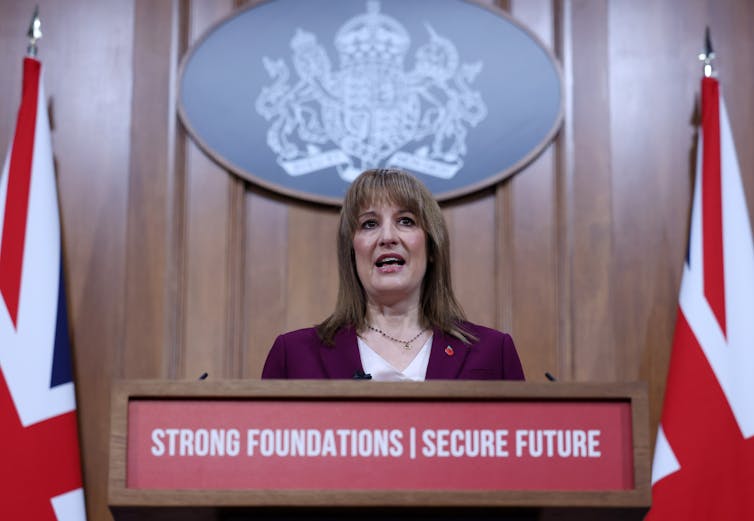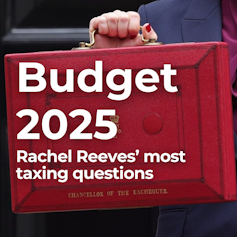Is there a strong economic case for dropping the two-child benefits cap? This is what the evidence tells us
- Written by Will Cook, Reader in Policy Evaluation, Manchester Metropolitan University
As she carefully prepares the UK’s reaction to her second budget the chancellor, Rachel Reeves, has now hinted that she may be ready to scrap the two-child benefits cap.
This controversial policy prevents parents from claiming child tax credit or universal credit[1] for more than two children (this is different to child benefit payments which are not limited by family size). According to the government’s own figures, the cap affects the households of 1.7 million children[2], and ditching it would cost upwards of £3.6 billion a year[3].
Introduced in 2017 as part of measures intended to cut public expenditure on welfare, the policy was designed to ensure[4] that households on means-tested benefits “face the same financial choices about having children as those supporting themselves solely through work”.
However, when it was brought in, the then Conservative government’s impact assessment[5] offered limited detail on the expected costs and benefits. A more comprehensive economic analysis of scrapping the policy would need to consider both the direct fiscal implications and the broader social and economic effects.
The direct fiscal cost is perhaps the most straightforward part of the calculation. Scrapping the cap would require the government to resume payments for families with more than two children, and the £3.6 billion annual cost[6] is considerable at a time when the UK treasury doesn’t have a lot of money to spend.
So what about the potential economic benefits? These fall into two broad areas.
The first concerns the direct impact on children. For example, there is good evidence[7] that additional household income during childhood improves future educational attainment and health. Increasing the money available to poorer households could therefore bring long-term social benefits.
However, the evidence to date on the specific effect of the two-child limit is limited. The Institute for Fiscal Studies recently examined the impact of the two-child limit on early years development (up to the age of five) and found no measurable effect[8] on school readiness.
This finding may have come as a surprise to campaigners who argue that the policy harms child development. But it is consistent with evidence from the US which found that giving extra money to poorer families had no impact on early child development[9].
It seems then that the short-term effects of lifting the two-child benefit cap may not be significant. But longer-term influences, particularly on educational attainment, health and lifetime earnings could still emerge.
The second area of potential economic benefit relates to encouraging people to have more children. The logic here is that reinstating benefits payments for more than two children would lead to higher fertility rates (the average number of children a woman has over her lifetime).
This is particularly relevant given that birth rates in the UK have declined significantly in recent years from 812,970 births[10] in 2012 to 694,685 in 2021[11].
As the population ages and lives longer, there is a risk that a shrinking working-age population will threaten economic prosperity[12]. This is partly through a reduction in the number of workers supporting those who are not working, but also through a reduction in innovation, the key driver of economic growth.
Yet evidence that the two-child limit has significantly deterred parents from having more children is weak. Research suggests only a small decline[13] in birth rates among low-income households likely to be affected by the policy.
Another important consideration is the policy’s effect on the labour market. Evidence indicates that the introduction of the two-child limit led to small increases in hours worked[14], and an increased likelihood of mothers of three children[15] entering the workforce. This implies that the two-child limit incentivised some people to work more.
If scrapping the cap reverses these effects, the fiscal cost could be even higher because of reduced tax revenue and lower economic output.
That said, this reduction in employment could also be framed as a benefit. Stricter benefit rules that increase employment may also lead to negative mental health outcomes, which also carry social and fiscal costs[16].

From an efficiency standpoint then, the case for scrapping the two-child limit is ambiguous. The evidence on its impact on fertility and childhood outcomes is mixed, and there may be a effects on the labour market whose net benefit is uncertain.
But from an equity perspective, the case is much stronger. It is easy to argue that reducing poverty is a desirable policy goal in its own right, regardless of whether it leads to other measurable social benefits.
Scrapping the cap is one of the most cost-effective ways of reducing child poverty. The Resolution Foundation thinktank estimates that abolishing the two-child limit would lift around 500,000 children out of poverty[17] and is the single most effective policy lever available to government. It may now be a lever that Reeves intends to pull.

References
- ^ universal credit (theconversation.com)
- ^ 1.7 million children (www.gov.uk)
- ^ £3.6 billion a year (ifs.org.uk)
- ^ designed to ensure (commonslibrary.parliament.uk)
- ^ impact assessment (www.parliament.uk)
- ^ £3.6 billion annual cost (ifs.org.uk)
- ^ good evidence (www.bmj.com)
- ^ no measurable effect (ifs.org.uk)
- ^ no impact on early child development (www.nber.org)
- ^ 812,970 births (www.ons.gov.uk)
- ^ 694,685 in 2021 (www.ons.gov.uk)
- ^ threaten economic prosperity (www.imf.org)
- ^ small decline (link.springer.com)
- ^ small increases in hours worked (www.journals.uchicago.edu)
- ^ mothers of three children (papers.ssrn.com)
- ^ social and fiscal costs (www.thelancet.com)
- ^ 500,000 children out of poverty (www.resolutionfoundation.org)
- ^ Sign up for free here (www.lse.ac.uk)







